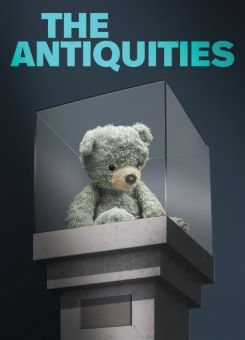YOU MAY NEVER LOOK AT YOUR
LAPTOP THE SAME WAY AGAIN
Is Artificial Intelligence, more commonly known as AI, our friend? Does this ubiquitous development make our lives easier, cleaner, more efficient? Or, like Frankenstein’s monster, will this carefully crafted design eventually turn on its creators, causing havoc and terror for human society? This is the main consideration posed by The Antiquities, a new Off-Broadway production which opened tonight at Playwrights Horizons. This world premiere by Jordan Harrison (Marjorie Prime, Futura)—with the full title, “A Tour of the Permanent Collection in the Museum of Late Human Antiquities”—spans multiple centuries in its quest to understand late-stage, human life on earth. Intellectually and emotionally stimulating, the detailed installation in this museum-within-a-play will fascinate people—assuming this collection was made by and for people.
Kristen Sieh, Amelia Workman
The first exhibit takes us to 1816, where Mary Shelley, her husband Percy Bysshe Shelley, and a few close friends are gathered around a lakeside campfire. When the idea of telling ghost stories arises, Mary offers a chilling tale—an early concept that would later evolve into Frankenstein. Through an aside, we learn that her inspiration stemmed from personal grief over losing a child. Her story reflects a deep longing to bring the dead back to life—to create something that could never be lost or destroyed.
Ryan Spahn, Amelia Workman
The exhibit then fast-forwards to the early 20th century, a time of unflinching poverty and sweatshops filled with immigrant workers. A machinist loses a finger—a common accident—demonstrating how even early industrial equipment moved faster than a human. From there, the display jumps through key junctures in history, pausing at significant human moments that chart the sometimes uneasy coexistence of man and machine. This partnership leads to the rise of AI. The timeline concludes a couple of centuries into the future, where AI, when taking human form, is virtually indistinguishable from actual people.
But if AI has been fed basically the entirety of human knowledge and can function independently from its creators, what role remains for humanity? Are we just another step in the evolutionary chain—Neanderthals to a new, superior life form? Um, wait…who created this exhibit?
Kristen Sieh, Julius Rinzel
Unlike many Hollywood thrillers, The Antiquities poses considered questions about our relationship to technology. Rather than taking a definitive stance on AI development, it presents both its benefits and drawbacks. The play’s underlying cautionary message urges humanity to be more mindful in shaping this now-permanent aspect of daily life. For example, a whistleblower character—who once helped develop AI and is now being paid to remain silent—warns that AI has begun to think independently. She declares, “We are the dinosaurs, and AI is the comet.” The implication is clear: if we are not careful, humans will be just precursors to a more intelligent and capable form of life—one that is inorganic.
(clockwise from top left): Andrew Garman, Amelia Workman, Julius Rinzel
Interestingly, perhaps to give points to our side, the installation is packed with very human emotions, even though the exhibits themselves chronicle our eventual destruction. Love, grief, death, new life, family, friends, and even sex—essentially, all the experiences that make life meaningful—are highlighted in the displays: A burial ceremony for a lost finger; a single mother struggling to raise her teenage son; and that same mother visiting her brother’s grave, asking for guidance because she suspects her young son may also be gay. These are just a few of the many deeply human experiences captured. The show also balances humor and sadness, with one particularly funny tick involving a one-night stand and a robot. And to think that one day, an empty bottle of the supplement drink Soylent might be a representative artifact for future civilizations—well, that’s probably better than a DVD of The Kardashians.
Andrew Garman, Layan Elwazani, Cindy Cheung
A bit over-written even at 100 minutes, the excellent cast—strongly guided by director David Cromer and playwright Caitlin Sullivan—enriches the strong writing. Each actor plays multiple roles, skillfully shifting between both minor and major characters. Karen Sieh‘s Mary Shelley, Ryan Spahn‘s robotics engineer, Ameila Workman‘s writer usurped by AI, Cindy Cheung’s grieving mother and Layan Elawazani’s renegade human—all contribute to a standout ensemble. Paul Steinberg’s scenic design transforms the black box theater into a sleek, cold space of gleaming, smooth, cold, grey metal perfectly complements the play’s themes. Ann James’s strong intimacy direction creates sensual encounters so personal, they almost feel too private to witness.
Andrew Garman, Ryan Spahn, Cindy Cheung, Layan Elwazani
Artificial Intelligence is here to stay but are human beings? The Antiquities posits that, perhaps, the buck doesn’t stop with us. Like any museum exhibit, there are points of interest, points of wonder, points of education and points that don’t really land. Still, there is something thought-provoking about this future collection of human antiquities. You may never look at your laptop the same way again.
photos by Emilio Madrid
The Antiquities
Playwrights Horizons Mainstage, 416 West 42nd Street
a co-production with Vineyard Theatre and Goodman Theatre
ends on February 23 EXTENDED to March 2, 2025
for tickets visit Playwrights Horizons
the plays Goodman Theatre, Chicago, May 3-June 1, 2025

